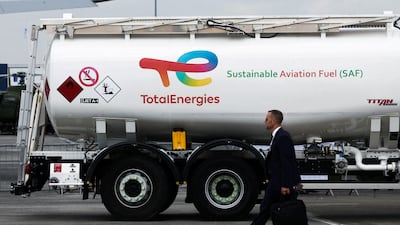Some energy companies have backed the Cop28 deal that calls for a transition away from fossil fuels by 2050.
The global stocktake was unanimously approved by 198 countries at the UN climate summit in Dubai on Wednesday, marking a historic moment in the fight against climate change.
France’s TotalEnergies said it welcomed the agreement, adding that it supported the goals of tripling renewable energy and doubling energy efficiency by the end of the decade.
“These objectives are at the heart of TotalEnergies' roadmap for 2030,” the company said in a statement to The National.
Italian energy company
The company also said that natural gas, considered a transitional fuel due to its lower emissions compared with other fossil fuels, could be useful in the move to net zero by 2050.
Carbon dioxide emissions from burning fossil fuels are expected to hit a record high this year amid higher emissions driven by India and China, according to the Global Carbon Budget report.
Earlier this year, TotalEnergies' board reaffirmed its support for the company’s multi-energy strategy, focusing on oil and gas assets with low emissions and diversification into renewables.
In October, QatarEnergy and TotalEnergies signed two sale and purchase agreements for the supply of up to 3.5 million tonnes of liquefied natural gas a year to France.
The company said it supported a “just, orderly and equitable” transition away from fossil fuels, adding that it is crucial for emerging countries aiming for economic and social development.
But TotalEnergies was not the only company welcoming Wednesday's news, with Italy's Eni in agreement.
"For the first time, the final agreement expresses the need to balance emission targets, energy security, access to energy and competitive development," a spokesperson told The National. "Both developed and developing countries have agreed on the complexity of the energy transition challenges ... that’s a great result."
Sharjah-based Crescent Petroleum said the agreement recognised the importance of the energy trilemma, which includes “achieving affordability and availability as well as sustainability".
It also acknowledged that the transition must be “just and orderly and equitable”, keeping the growing energy needs of the developing world in mind, the company’s chief executive, Majid Jafar, told The National.
The International Energy Agency expects global demand for oil and gas to peak by 2030 with an increasing adoption of renewable energy technology and electric vehicles.
The current annual investment in the oil and gas sector of $800 billion is double what is required by 2030 in the 1.5°C scenario, the agency has said.
Javier Cavada, the chief executive and president of Mitsubishi Power Emea, drew a comparison between the transition from fossil fuels to alternative energy sources and the shift from horses to the automotive industry in the 20th century.
“We have a fossil fuel society … I wouldn't say we have an industry,” Mr Cavada told The National.
Mitsubishi Power, a subsidiary of Japan's Mitsubishi Heavy Industries, provides energy solutions.
Despite the rapid adoption of electric cars and renewable energy, fossil fuels still meet more than 80 per cent of the world's energy requirements.
The Cop28 agreement was struck against the backdrop of two geopolitical conflicts and an economic slowdown, that have raised concerns over energy supply.
Russia’s invasion of Ukraine last year pushed natural gas prices to record highs, forcing traders in developing economies such as India and China to boost their imports of coal.
Despite that, global coal-fired power generation is on track to peak in 2023 as new sources of renewable and low-carbon energy expand rapidly, according to Rystad Energy.
The Norway-based consultancy expects coal consumption to start declining next year as solar and wind grow in popularity.










